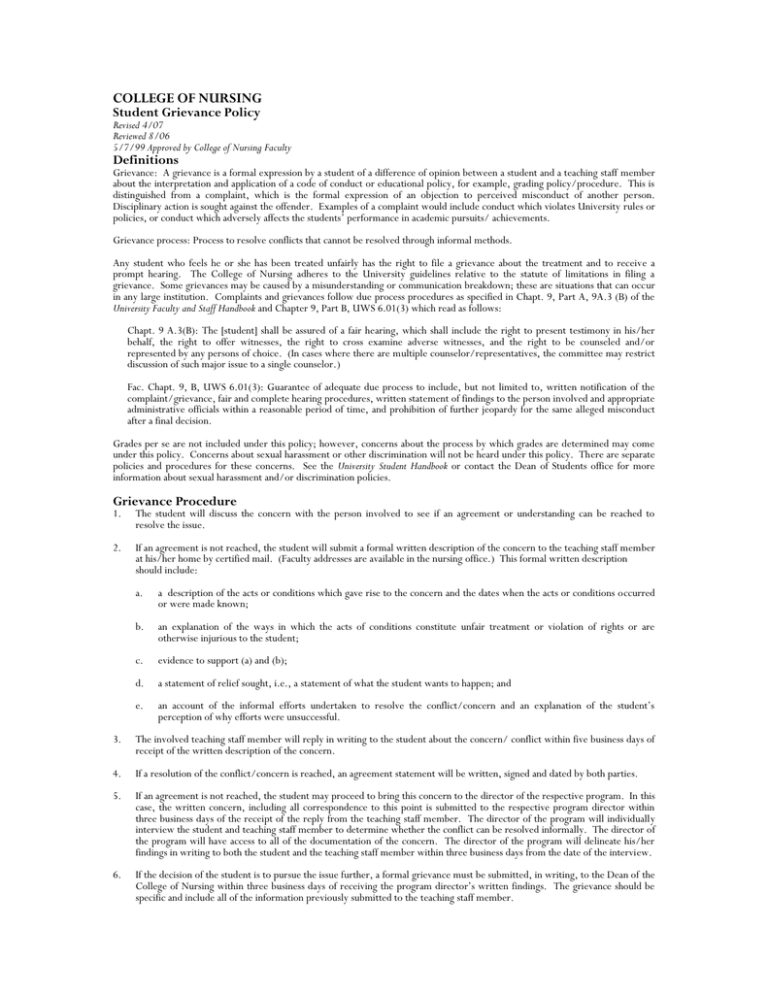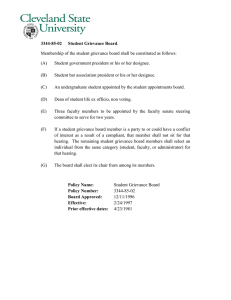COLLEGE OF NURSING Student Grievance Policy Definitions
advertisement

COLLEGE OF NURSING Student Grievance Policy Revised 4/07 Reviewed 8/06 5/7/99 Approved by College of Nursing Faculty Definitions Grievance: A grievance is a formal expression by a student of a difference of opinion between a student and a teaching staff member about the interpretation and application of a code of conduct or educational policy, for example, grading policy/procedure. This is distinguished from a complaint, which is the formal expression of an objection to perceived misconduct of another person. Disciplinary action is sought against the offender. Examples of a complaint would include conduct which violates University rules or policies, or conduct which adversely affects the students’ performance in academic pursuits/ achievements. Grievance process: Process to resolve conflicts that cannot be resolved through informal methods. Any student who feels he or she has been treated unfairly has the right to file a grievance about the treatment and to receive a prompt hearing. The College of Nursing adheres to the University guidelines relative to the statute of limitations in filing a grievance. Some grievances may be caused by a misunderstanding or communication breakdown; these are situations that can occur in any large institution. Complaints and grievances follow due process procedures as specified in Chapt. 9, Part A, 9A.3 (B) of the University Faculty and Staff Handbook and Chapter 9, Part B, UWS 6.01(3) which read as follows: Chapt. 9 A.3(B): The [student] shall be assured of a fair hearing, which shall include the right to present testimony in his/her behalf, the right to offer witnesses, the right to cross examine adverse witnesses, and the right to be counseled and/or represented by any persons of choice. (In cases where there are multiple counselor/representatives, the committee may restrict discussion of such major issue to a single counselor.) Fac. Chapt. 9, B, UWS 6.01(3): Guarantee of adequate due process to include, but not limited to, written notification of the complaint/grievance, fair and complete hearing procedures, written statement of findings to the person involved and appropriate administrative officials within a reasonable period of time, and prohibition of further jeopardy for the same alleged misconduct after a final decision. Grades per se are not included under this policy; however, concerns about the process by which grades are determined may come under this policy. Concerns about sexual harassment or other discrimination will not be heard under this policy. There are separate policies and procedures for these concerns. See the University Student Handbook or contact the Dean of Students office for more information about sexual harassment and/or discrimination policies. Grievance Procedure 1. The student will discuss the concern with the person involved to see if an agreement or understanding can be reached to resolve the issue. 2. If an agreement is not reached, the student will submit a formal written description of the concern to the teaching staff member at his/her home by certified mail. (Faculty addresses are available in the nursing office.) This formal written description should include: a. a description of the acts or conditions which gave rise to the concern and the dates when the acts or conditions occurred or were made known; b. an explanation of the ways in which the acts of conditions constitute unfair treatment or violation of rights or are otherwise injurious to the student; c. evidence to support (a) and (b); d. a statement of relief sought, i.e., a statement of what the student wants to happen; and e. an account of the informal efforts undertaken to resolve the conflict/concern and an explanation of the student’s perception of why efforts were unsuccessful. 3. The involved teaching staff member will reply in writing to the student about the concern/ conflict within five business days of receipt of the written description of the concern. 4. If a resolution of the conflict/concern is reached, an agreement statement will be written, signed and dated by both parties. 5. If an agreement is not reached, the student may proceed to bring this concern to the director of the respective program. In this case, the written concern, including all correspondence to this point is submitted to the respective program director within three business days of the receipt of the reply from the teaching staff member. The director of the program will individually interview the student and teaching staff member to determine whether the conflict can be resolved informally. The director of the program will have access to all of the documentation of the concern. The director of the program will delineate his/her findings in writing to both the student and the teaching staff member within three business days from the date of the interview. 6. If the decision of the student is to pursue the issue further, a formal grievance must be submitted, in writing, to the Dean of the College of Nursing within three business days of receiving the program director’s written findings. The grievance should be specific and include all of the information previously submitted to the teaching staff member. Upon receipt of the written grievance, the Dean (or in the Dean’s absence, the Chair of the College Committee) within three business days will: a. appoint a five-person ad hoc committee – three tenured, tenure track or Instructional Academic Staff with continuing contracts, 5 semesters of service and voting rights; and two students – and designates a chair from among the faculty members. Judicious selection of committee members would include disqualifying students and/or faculty who have a relationship with either party. b. forward copies of all written documentation of the grievance to the Chair of the Ad Hoc Grievance Committee; and c. forward a copy of the grievance to the teaching staff member involved. 7. The grievance committee will meet to examine the evidence, consulting with the involved parties as appropriate and decides whether the grievance merits a hearing. 8. A hearing shall be necessary only when the Ad Hoc Grievance Committee believes there is sufficient evidence to indicate the possibility that the student’s rights have been violated or unfair treatment has been received. Interference by either a faculty/teaching staff member or another student during any stage of the grievance process is considered an unfair action and is prohibited. If there is no hearing, a report will be submitted within ten business days to the involved parties and to the College Dean. If the Ad Hoc Grievance Committee decides a hearing is merited, the hearing is to be completed within twenty business days. At the conclusion of the hearing the committee shall transmit its findings and recommendations to the College Dean with copies to the involved parties. 9. The Dean will in turn advise the student and the Ad Hoc Grievance Committee of his/her decision. 10. All meetings of the Ad Hoc Grievance Committee will meet the requirement of the Wisconsin State Statutes Open Meeting Law (Chapt. 5, University of Wisconsin Oshkosh Faculty Handbook). Meetings related to sensitive information may be held in closed session at the discretion of the chair. In addition, either party in the grievance may request a closed meeting. 11. Open meeting notices are posted in the faculty supply room and on the student bulletin board outside N/E 148. 12. If either party withdraws from the process the Dean makes a summary judgment and informs the involved parties of the same within ten business days from notice of the party’s withdrawal. 13. The Dean, with mutual agreement of the teaching staff member and the student, or at the request of the Ad Hoc Grievance Committee, may extend timelines for any of the steps in the process.

